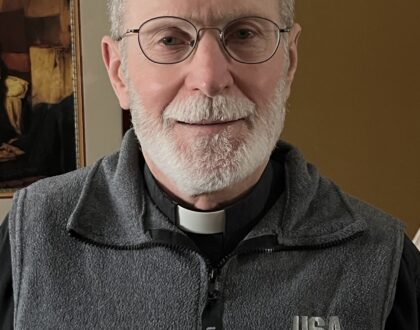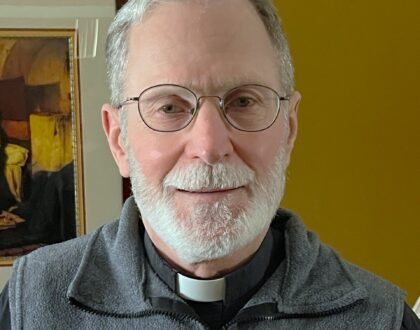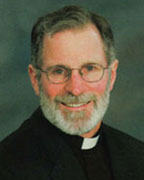Homily, September 3, 2023

From The Pastor
To love others is an obvious and non-negotiable reality of the Christian life. God is the origin and identity of all love. God is love. In love we are created as an expression and desire of Divine Love. Love by nature is self-giving. Love offers itself for the sake of the good of others. Love is the deepest longing, desire, and need of every human being. To be human is to love. Love is our nature as human beings created by God who is Love. There is no such thing as a self-made, isolated, standalone Christian. Love by nature is relational and can only realize itself in connection with other people.
Jesus is the Incarnation of Divine Love. Remaining God and becoming human, Jesus is the enfleshment of Divine Love for the world. Jesus is the fulness of what it means to be a fully realized human being. The purpose of the Incarnation is for the redemption of humanity and all creation. In the lie of evil that leads to the disorder of sin, love is often hindered, hidden, or lost. The person of Jesus enfleshed in the communion of human and Divine Love, serves as the remedy for sin for all those who seek the truth of love in the image and intention of God. Love and redemption are not only the identity of Jesus, but they are also his mission, his passion, and deepest longing in the will of the Father.
Jesus is quite open about this reality, much to the distress of those around him. Jesus predicts his suffering and death on a Cross, only to rise three days later. Immediately after being given authority of the yet to be formed Church, Peter rebukes Jesus for saying such words. To Peter, they are unthinkable and make no sense. Peter expresses this with strong emotion and deep conviction.
Hitting a nerve, Jesus responds even more strongly: “Get behind me you Satan! You are an obstacle to me. You are not thinking as God does, but as human beings do.” Jesus will not deny his identity as One with the Father, nor will he compromise his mission of redemption that can only be accomplished through his death. In both his human and Divine nature, Jesus will not give into the human ego or fear of Peter. Jesus will not allow the obstacle and distraction Peter presents.
Harsh as this seems, Jesus is speaking truth and the truth Jesus speaks is that of redemptive love. Note that Peter speaks for all the disciples, as they undoubtably feel the same way. Peter professes Jesus as the Messiah, then rebukes the kind of Messiah Jesus expresses himself to be. Peter has his own ideas of what the Messiah should look like. Human ego gets in the way and Jesus will not allow it.
Mature love will always include some degree of surrender. Surrender is not a concept that is understood or welcomed in our culture. It is made to seem contrary to human nature. This is the lie of sin and a great obstacle to love. To sincerely love another, I must in some way give up something of myself for the sake of the good of the other. For Jesus, it was his whole life, his entire person given in death to reveal the surpassing power of Divine love to heal, forgive, and reconcile. Nothing less could satisfy the sacrifice necessary for the work of redemption.
“Whoever wishes to come after me must deny them self, take up their Cross and follow me.” If I prefer to save myself in the identity I have made for myself, I will lose all. If I am willing to lose or surrender myself for the sake of others, I will find my full and true self in God. Self-surrender is the way of the Cross.
We all know how to surrender because we all know how to love. To receive love, a person must give love. Love freely given for the good of another offers its own reward and bears its own fruit. Selfish love or self-seeking love is not real and will never last. As humans, we are pretty good at pleasing ourselves. This kind of happiness can only go so far. If we seek to please or serve others out of love or in a time of need, this happiness fills the soul with true peace.
It can be hard to learn to put others first and myself second, or even third. This is easier for the one who maturely loves them self in the awareness of Divine love. Knowing deep self-love creates a freedom to see the wisdom and identity of God in others which inspires relationships of love through service. This is the fruit of redemption at work.
Consider any obstacle, be they persons or things, that hinder you from loving God, yourself, and others more freely. Like Jesus, stand strong against internal and external obstacles to your freedom as a human being to live a life noticeably marked by love.
Father John Esper
Recent Sermons

Homily, April 6, 2025
April 05, 2025

Homily, March 30, 2025
March 27, 2025

Homily, March 23, 2025
March 20, 2025

